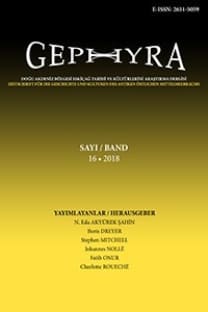Hitit Kralı I. Hattusili’nin Yıllıkları ve Kayıp Altın Heykeli
Hitit başkenti Hattuşa’da kazılarda bulunan pişmiş toprak tabletler sözde erken Hitit kralı I. Hattuşili’nin (yak. 1650-1620) askeri başarısının beş yılını kaydetmektedir. Genel olarak Hattuşili’nin ‘yıllıkları’ olarak bilinen bu belge (kralın) gümüş kaplanmış altın heykeline değinmektedir. Bu kaplamalar muhtemelen krala adanmış bir kutsal alanın bir kısmını oluşturmaktaydı. Burada, heykelin kendisinde, kaplamalarında veya ikisinde de muhtemelen yıllıkların ana versiyonu yazılmıştır. Günümüzde ikisi de kayıptır ve elimizde sadece pişmiş toprak tabletin yıllıklar hakkında anlatımı –ya da ondan arta kalan– vardır. Bu anlatımda yer alan büyük uyumsuzluklar ve bazı önemli eksikler bunu belgeleyen pişmiş toprak tabletlerin sadece kralın hükümdarlık döneminin çoğunu ve ya hepsini kapsayan çok daha büyük bir kompozisyonun fragmanları olduğunu belirtmektedir. Heykel ve onu kaplayan tapınağın (?)Hitit döneminde ateşle, havadan ve ya düşman tarafından ya kazayla ya da bir düşman saldırısıyla tahrip edilmesinden sonra bu fragmanlar yıllıklardan kalan tek şeydir. Hitit yazarlarının belgeyi yapabildikleri kadar yeniden yaratma çabaları ile sonradan yıllıklardan geride kalan fragmanlarda bulunan kırık dökük bilgilerden olayların bir dizilişini birleştirmeye çalıştığını ileriye sürüyorum. Onların yaptığı kalan parçaların makul şekilde uyumlu bir toplamasını yaparak belgeledikleri bölümleri beş yıllık bir döneme sıkıştırmaktı. Ama bunu yaparak Hattuşili’nin başarılarının aralıksız bir anlatımını –her ne kadar karmakarışık ve büyük eksikleri olan bir anlatım olsa da– sağlama girişiminde bulunarak aralarında yıllar olan olayları birleştirmişlerdi.
Anahtar Kelimeler:
I. Hattusili, Annaller (I. Hattusili), heykel (I. Hattusili), Hattusa, Arzawa, Yamhad/Halep, Akadca
The Annals and Lost Golden Statue of the Hittite King Hattusili I
Clay tablets excavated from the Hittite capital Hattusa supposedly record five years of the military exploits of the early Hittite king Hattusili I (c. 1650-1620). The document, commonly known as Hattusili’s ‘Annals’, refers to a golden statue (of the king) housed in silver-plated surrounds. These surrounds probably formed part of a sanctuary dedicated to the king. Here what was probably the chief version of the Annals was recorded, on the statue itself, on its surrounds, or both. Both are now lost, and we are left with only the clay tablet account of the Annals – or what survives of it. Major inconsistencies in this account and a number of significant omissions from it, suggest that the clay tablets which record it were merely fragments of a much larger composition covering most or all the king’s reign. These fragments were all that remained of the Annals when the statue and the sanctuary(?) which housed it were destroyed by fire in Hittite times, whether accidentally or by enemy action. I suggest that Hittite scribes later tried to put together a sequence of events from the scraps of information found on the Annals’ remaining fragments, in their efforts to recreate all they could of the document. What they did was to make a reasonably coherent compilation of the surviving pieces, compressing the episodes they recorded into a period of five years. But in so doing, they put together events that may have taken place years apart, in an attempt to provide a continuous account of Hattusili’s achievements, though a much distorted one with major omissions.
Keywords:
Hattusili I, Annals (Hattusili I), statue (Hattusili I), Hattusa, Arzawa, Yamhad/Aleppo, Akkadian,
___
- R. H. Beal, The Ten Year Annals of Great King Muršili II of Hatti, in: W. W. Hallo – K. L. Younger (edd.), The Context of Scripture, vol. 2, 2003, 82-90.
- G. Beckman, Hittite Diplomatic Texts, (2nd edn.) Atlanta 1999.
- G. Beckman, The Annals of Hattusili I, in: M. W. Chavalas (ed.), The Ancient Near East, Oxford 2006, 209-222.
- T. R. Bryce, The Kingdom of the Hittites, (new edn.) Oxford 2005.
- T. R. Bryce, The Routledge Handbook of the Peoples and Places of Ancient Western Asia, London-New York 2012.
- T. R. Bryce, The Land of Hiyawa (Que) Revisited, Anatolian Studies 66, 2016, 67-79.
- M. W. Chavalas (ed.), The Ancient Near East, Oxford 2006.
- CTH = E. Laroche, Catalogue des textes hittites, Paris 1971.
- B. Dinçol et al., Two new inscribed Storm-God stelae from Arsuz (İskenderun) ARSUZ 1 and 2, Anatolian Studies 65, 2015, 59-77. E. L. Greenstein, Autobiographies in Ancient Western Asia, in: J. M. Sasson (ed.), Civilizations of the Ancient Near East, New York 1995, vol. 4, 2421-2432.
- H. G. Güterbock, The Deeds of Suppiluliuma as told by his son, Mursili II, Journal of Cuneiform Studies 10, 1956, 41-68, 75-98, 101-130.
- W. W. Hallo – K. L. Younger (eds.), The Context of Scripture (3 vols.), Leiden-Boston 2003.
- S. Jackson, Contrasting representations and the Egypto-Hittite treaty, in: K. H. Keimer – G. Davis (edd.), Registers and Modes of Communication in the Ancient Near East, London-New York 2018, 43-58.
- J. D. Hawkins, The Hieroglyphic Inscriptions of the Sacred Pool Complex at Hattusa (SÜDBURG), Wiesbaden 1995.
- M. Poetto, L’iscrizione luvio-geoglifica di Yalburt. Nuove acquisizioni relative alla geografia dell’Anatolia sud-occidentale (Studia Mediterannea 8), Pavia 1993.
- J. B. Pritchard, Ancient Near Eastern Texts Relating to the Old Testament, Princeton 1969.
- H. Otten, Die Bronzetafel aus Boğazköy: ein Staatsvertrag Tuthalijas IV, Wiesbaden 1988.
- M. Salvini, Une Lettera di Hattusili relativa alla spedizione contro Hahhum, Studi Micenei ed Egeo-Anatolici 34, Rome 1984, 61-80.
- B. Stavi, The Reign of Tudhaliya II and Šuppiluliuma I. The Contribution of the Hittite Documentation to a Reconstruction of the Amarna Age. (Texte der Hethiter 31), Heidelberg 2015.
- Th. van den Hout, A Century of Hittite Text Dating and the Origins of the Hittite Cuneiform Script, Incontri Linguistici 32, 2009, 11-35.
- Th. van den Hout, Reflections on the Origins and Development of the Hittite Tablet Collections in Hattuša and their Consequences for the Rise of Hittite Literacy, in: F. Pecchiolo Daddi – G.Torri – C. Corti (edd.), Central-North Anatolia in the Hittite Period. New Perspectives in Light of Recent Research. Acts of the International Conference Held at the University of Florence (7-9 February 2007) (Studia Asiana 5), Rome 2009, 71-96.
- ISSN: 1309-3924
- Yayın Aralığı: Yılda 2 Sayı
- Başlangıç: 2004
- Yayıncı: Nalan Eda AKYÜREK ŞAHİN
